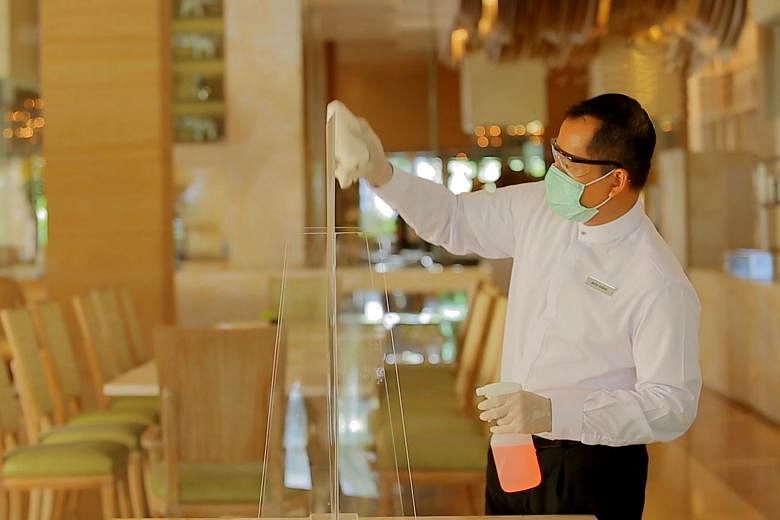A picture of a vacationing family of four standing on the beach, sand on their feet and sun in their faces, adorned the website of a luxury resort in Bali, Indonesia. Splashed across the top were the words: We are still open! Buy now stay later.
Mulia Bali, the five-star choice resort of celebrities such as Lupita Nyong'o and Millie Bobby Brown, was dangling an enticing offer: Stay for three nights, pay for two. Or stay for five nights, pay for three.
Simply make a booking by June 15 and check in any time before December next year.
Such "pay-now-stay-later" deals have become a vital lifeline for hotels trying to stay afloat amid the coronavirus pandemic.
From discounts and gift vouchers with long validity periods to floating breakfasts in private pools and romantic dinners on cliff edges, operators are sparing no effort to woo global travellers to return.
Mr Adam Bardetta, manager of Mulia Bali, where room rates start from $650 a night, said: "The pandemic has really affected the hospitality sector tremendously and our resort is no exception."
The hospitality and tourism sector in Indonesia has taken a massive pounding from the fallout from Covid-19.
Foreign tourist arrivals plunged 87 per cent in April compared with the same period last year, numbering only 160,042, official figures show. In April, at least 1,266 hotels reportedly closed and 150,000 employees suffered job losses and salary cuts.
Mr Paulus Totok Lusida, Real Estate Indonesia chairman and an adviser to the Indonesian Hotel and Restaurant Association, said occupancy rates had fallen by around 90 per cent and the deposits received from the promotional packages would go a long way towards cushioning the impact.
"All businesses need cash flow. These hotels... have also sought the association's approval to launch the promotions."
The market is showing signs of recovery after the government began to gradually ease restrictive measures put in place to stem the outbreak.
Four Seasons Hotel Jakarta said it has sold a "significant" number of vouchers for a night's stay at its executive suite for two million rupiah (S$195), with a stay period till March 31 next year.
Most of the buyers were locals living in Jakarta and nearby cities such as Bandung. But none has booked a date yet, said the hotel's public relations and communications director Rumman Amanda.
"Looking at the current situation, I think this is very normal since we don't know when we can travel again," she told The Straits Times.
TOURISM UNDER 'NEW NORMAL'
While nobody can predict when the pandemic will end, broad changes in the industry are certain.
Tourism and Creative Economy Minister Wishnutama Kusubandio said he expected the tourism sector to make a rebound next year and industry players to place more emphasis on hygiene and cleanliness.
Going digital will also be the rule, rather than the exception. "This pandemic will pave the way for a 'new normal'. We have seen how technology and digital media have formed new routines and lifestyles," Mr Wishnutama told the Association of Indonesian Tour and Travel Agencies last month.
Hotel operators said disinfectant, hand sanitiser and face masks will become as essential as swaying palm trees and turquoise oceans.
Mr Aviadi Purnomo, general manager and a co-owner of Tandjung Sari beach resort in Denpasar, Bali, said the property was forced to close for the first time in April since opening its doors in 1962.
He estimated losses of around four billion rupiah so far, and hopes the hotel can reopen on July 1.
"We survived Sars (severe acute respiratory syndrome), terrorist bombings, volcanic eruptions and the financial crisis... this is an extraordinary situation. In the second week of March, we were free-falling and occupancy went down to almost zero," he said.
Besides incorporating social distancing measures and hygiene routines at the hotel for a new normal, he is also studying how to whip up healthier meals using organic vegetables, as well as how to improve staff efficiency and productivity. "We want to help build the guests' immunity. If we reopen and provide the same thing... it's as if we never learnt anything from the pandemic."
While travellers remained cautious, a regular guest at Tandjung Sari, Australian Frances Hawker, said she had bought "a few weeks' worth of vouchers" to help her Balinese friends.
"There is a risk that we may never be able to use them, but we were willing to take that risk. The vouchers seemed to be a great way to help the staff who have helped us have great holidays there over many years."


